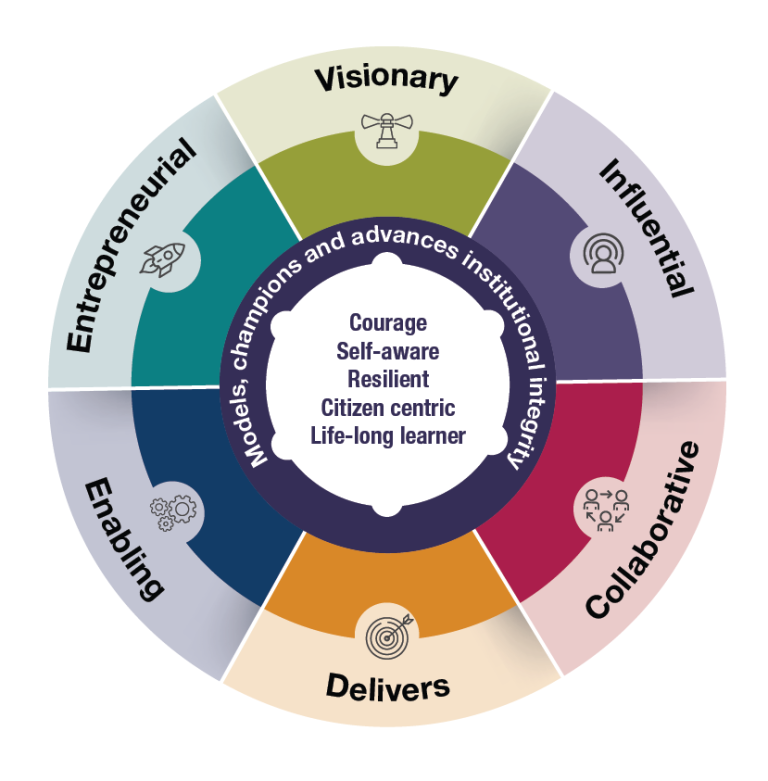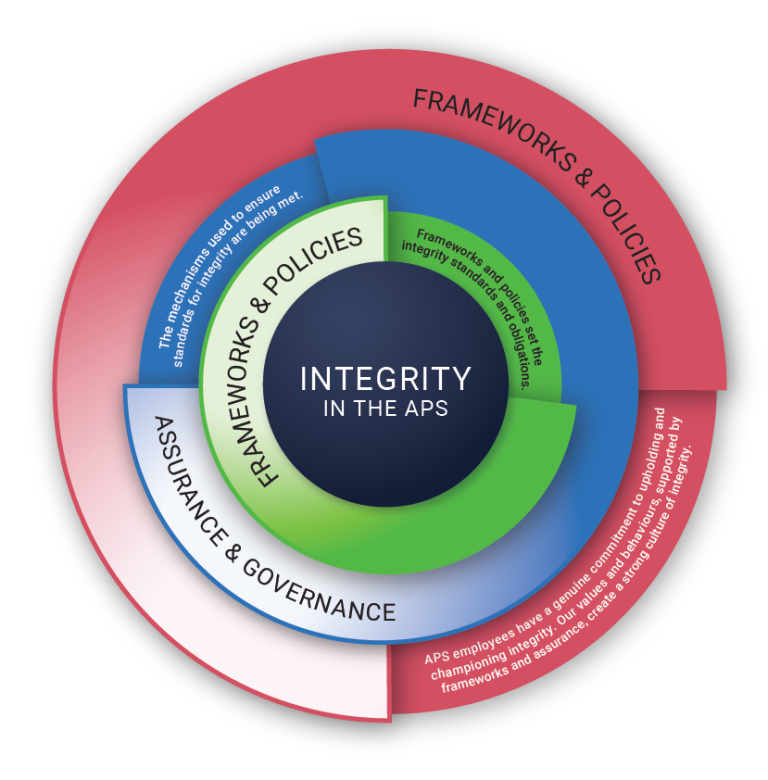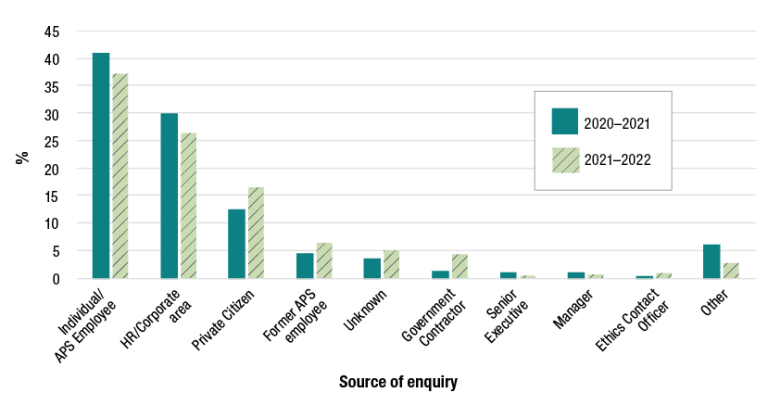1.3 Integrity in all the APS does
Every public servant has a role to play in ensuring the APS is trustworthy and meets the high expectations of the Australian people. Fostering a strong culture of integrity across the APS continues to be of the highest priority.
This year, the APSC implemented a suite of pro-integrity measures for the APS, responding to all 10 recommendations of the report conducted by Stephen Sedgwick AO in 2020 on institutional integrity, and agreed by the Secretaries Board.[11]
New provisions in the APS Commissioner’s Directions enhance transparency and accountability. Of particular note is the introduction of mandatory integrity training for new APS employees. In addition, a series of SES integrity masterclasses have been developed and integrity-related workforce management guidance updated.
The APSC has strengthened the capability of public servants to model, champion and advance institutional integrity through a new leadership capabilities model, endorsed by the Secretaries Talent Council and Deputy Secretaries Talent Council: VICEED (Figure 1.3).
Fig 1.3 VICEED Leadership Capabilities Model

Source: APSC
Integrity and professionalism are also now better reflected in the Secretaries’ Performance Framework managed by PM&C.
The focus on integrity in the APS will be greatly heightened by the Government’s commitment to establish a powerful, independent and transparent National Anti-Corruption Commission with broad jurisdiction to investigate serious and systemic corruption in government and the public sector. [12]
| Championing an integrity culture SES Integrity Masterclass Series | ||
|---|---|---|
| In May 2022, the APSC partnered with the Australia and New Zealand School of Government to launch the SES Integrity Masterclass Series. This assists senior APS leaders to strengthen integrity culture and capability within their organisations and across the wider public service. | ||
| Integrity is crucial to building a high-performing and trusted public service. It is a cornerstone of the APS. While every member of the APS is obliged to act with integrity, SES leaders – as stewards of organisational culture – play an important role in setting expectations and modelling behaviours. With this in mind, the APSC developed the SES Integrity Masterclass Series to equip SES participants with the knowledge and tools needed to build key integrity capabilities on both individual and organisational levels. | ||
| The series comprises three masterclasses, with modules delivered online and in-person. The modules include an opening address from the APS Commissioner, a panel discussion with prominent APS integrity experts, videos, and a face-to-face workshop. | ||
| On completion, participants have the knowledge and tools to: Champion integrity – cultivate an environment where employees feel confident to raise integrity concerns and have positive and empowering conversations about integrity. | ||
| On completion, participants have the knowledge and tools to: | ||
| Champion integrity – cultivate an environment where employees feel confident to raise integrity concerns and have positive and empowering conversations about integrity. Lead with integrity – foster a positive and collaborative working environment conducive to high performance. Promote integrity – implement tools and resources to build the integrity capability of teams and organisations. |
||
| 'As people progress through the ranks, they have greater personal responsibility for driving integrity culture at an institutional level and are faced with far more complex integrity challenges. Integrity in the APS needs constant care and maintenance.'
- Peter Woolcott AO, APS Commissioner |
APS Commissioner's Directions 2022
The Commissioner’s Directions are another avenue through which the integrity of the APS is upheld and maintained. The Directions prescribe the standards to which Agency Heads and APS employees must comply to meet their obligations under the Public Service Act 1999. The Directions also support APS agencies to incorporate and uphold the APS Values and Employment Principles, conduct recruitment activities and undertake performance management.
On 1 February 2022, the APS Commissioner issued new Directions, replacing the 2016 Directions, in support of this aim. They include new provisions to:
- mandate integrity training for APS employees
- require agencies to consult with the Commissioner before entering into a confidentiality or non-disclosure agreement with an APS employee relating to sexual harassment
- require agencies to notify the Commissioner when entering into any confidentiality or non-disclosure agreement with an APS employee
- provide additional circumstances where an employee’s name can be excluded from the Australian Public Service Employment Gazette when publishing a termination for breach of the Code of Conduct
- direct that APS employees be engaged on probation
- establish how employment related data is to be provided by agencies to the APSC
- require agency heads to consult with the Commissioner regarding suspected breaches of the Code of Conduct by SES employees
- provide greater flexibility in utilising merit lists and merit pools.
The Public Service Act and Directions are simply one tool that embeds integrity in APS culture.
All APS agencies play a role in integrity matters. An Integrity Agencies Group assists in the coordination, enhancement and promotion of institutional integrity across APS agencies. The group’s mission is to place integrity at the centre of the work of the public sector and ensure the APS approach to integrity is integrated, capable and transparent. In 2021–22, key areas of focus included the establishment of the Commonwealth Fraud Prevention Centre and the development and implementation of proposed reforms to the Public Interest Disclosure regime.
Other collaborative opportunities on integrity across the APS include the Ethics Contact Officer Network and the Cross-agency Code of Conduct Practitioners’ Forum. Through the network, more than 30 agencies build capability for ethical decision-making, profile emerging ethics and integrity issues, and contribute to the APSC’s pro-integrity work. Recent discussion topics have included complaints handling, applying the APS conduct framework to employees’ personal behaviour, and fraud and corruption prevention in the APS. The Cross-agency Code of Conduct Practitioners’ Forum, co-chaired by the APSC and the Department of Defence, focuses on sharing expertise and best practice in applying the Code of Conduct in agencies. During 2021–22, the forum considered issues such as managing the interplay between employees’ personal behaviour and the APS conduct framework, case management systems, and misconduct that may also be a criminal matter.
APSC Integrity Services and Resources
The APSC provides services and resources to help APS agencies and employees understand their integrity obligations and how they apply in a range of circumstances. These include the Ethics Advisory Service (EAS), the Integrity Metrics Resource, Integrity in the APS induction eLearning module guides, the Handling Misconduct: A human resource manager’s guide, and integrity fact sheets (Figure 1.4).
Figure 1.4: Integrity in the APS

Ethics Advisory Service
The APS Values make clear that all APS employees must demonstrate leadership, act with integrity and remain trustworthy in performing their duties. The EAS plays an important role in supporting APS employees to meet these expectations.
The EAS provides information, policy advice and guidance on applying the APS Values and Code of Conduct, and the APS conduct framework. It also provides options, considerations, and strategies to help APS employees work through ethical issues and dilemmas and make sound judgements and choices.
The EAS receives enquiries from APS employees, agency corporate or human resources (HR) areas, legal practitioners, managers, and members of the public. Most enquiries fall within the broad categories of ‘misconduct’ (35%) or ‘conflict of interest’ (11%). Other topics of enquiry include bullying and harassment, interpretation of the APS Values or elements of the Code of Conduct, and behaviour by employees in a private capacity, including on social media.
Some enquiries are straightforward, while others are sensitive and complex. The EAS is not directive, nor does it form a view on the merits of a matter. Instead, it uses the REFLECT decision-making model to help enquirers identify and work through their query or dilemma and empower them to make a sound decision. This includes:
- helping them to recognise the ethical dimensions of their situation
- referring them to sources of relevant information
- helping them evaluate options and consider likely and unintended consequences and
- inviting them to see their situation from different perspectives. In this way, the EAS promotes ethical decision-making in the APS.
In this way, the EAS promotes ethical decision-making in the APS.
In 2021–22, the EAS received 376 enquiries with 37% from individual APS employees, 26% from agency corporate or HR areas, and 16% from members of the public (Figure 1.5). Enquiries were received from APS employees between APS 4 and SES 1 classifications, with 10% coming from EL 1 employees. Of those who provided their location, the greatest proportion (20%) was in the Australian Capital Territory (ACT). The EAS provides advice on a confidential basis and those who contact the service can choose to remain anonymous.
Figure 1.5: Ethics Advisory Service source of enquiries

Source: Ethics Advisory Service
Enquiries to the EAS help the APSC identify areas in which additional support and guidance may be beneficial. The revised Handling Misconduct guidance, for example, was partly informed by enquiries to the EAS about addressing conduct matters.
Zero tolerance for corruption
Monitoring and responding to incidents of corruption is therefore of paramount importance to the APS, across all its operations. Collecting and reporting on integrity-related data is one way the APS promotes transparency and trust in its activities.
The 2022 APS Agency Survey defined corruption as ‘the dishonest or improper exercise of a Commonwealth public official functions.’ While data shows that corruption in the APS is not a systemic issue, any form of corruption must be taken seriously – it has no place in the APS.
In 2021–22, 172 instances of behaviour that could be categorised as corrupt were identified through investigations for a suspected breach of the APS Code of Conduct (Figure 1.5). Of these employees, 138 (80%) were found to have breached the APS Code of Conduct. This is a reduction from 256 employees identified in 2020-21.
Figure 1.6: Number of employees investigated for corrupt behaviour (2014 to 2022)

Source: APS Agency Survey
The types of possible corrupt behaviours investigated in 2021–22 mostly related to acting or failing to act in the presence of a conflict of interest (97 employees). The next most common type investigated included fraud, forgery or embezzlement (45 employees) and nepotism (31 employees).
While these numbers may be relatively low, they reinforce the importance of vigilance. In 2021–22, these behaviours were identified through direct reports from managers and other employees, and through dedicated monitoring systems and integrity units within agencies. This illustrates the importance of both organisational culture and integrity-related structures for ensuring the APS maintains the highest levels of integrity.
Recognising that employees witness behaviour that may not be officially reported, the APS Employee Census asked if respondents had seen another employee in their agency engage in behaviour they thought was serious enough to be corruption over the preceding 12 months. The limitations with this measure are known; multiple employees may have witnessed a single incident. Employee perception data is, however, still a useful indicator for the integrity climate of agencies and the broader APS.
In the 2022 APS Employee Census, 3.1% of respondents (n = 3,645) said that in the previous 12 months they had witnessed another employee in their agency engage in behaviour they believed was serious enough to be corruption. This is slightly reduced from 2021 (3.8%) and represents a continued downwards trend in the proportion witnessing corruption since 2018 (Figure 1.7).
Figure 1.7: Reported rates of witnessed potential corruption (2017 to 2022)

Source: APS Employee Census
While it is encouraging that the available metrics for corruption in the APS trended downwards in 2022, the APS must continue to be vigilant. Efforts to foster a strong culture of integrity continue, as do monitoring and responding to incidents of corruption. Such efforts serve to ensure that the APS has strong foundations for high performance and remains a valued and inclusive employer of talented employees.
Footnotes
[11] S Sedgwick, Report into consultations regarding APS approaches to ensure institutional integrity, 16 December 2020.
[12] The Governor-General of the Commonwealth of Australia, Opening of the First Session of the Forty-seventh Commonwealth Parliament, Parliament House Canberra, 26 July 2022.



